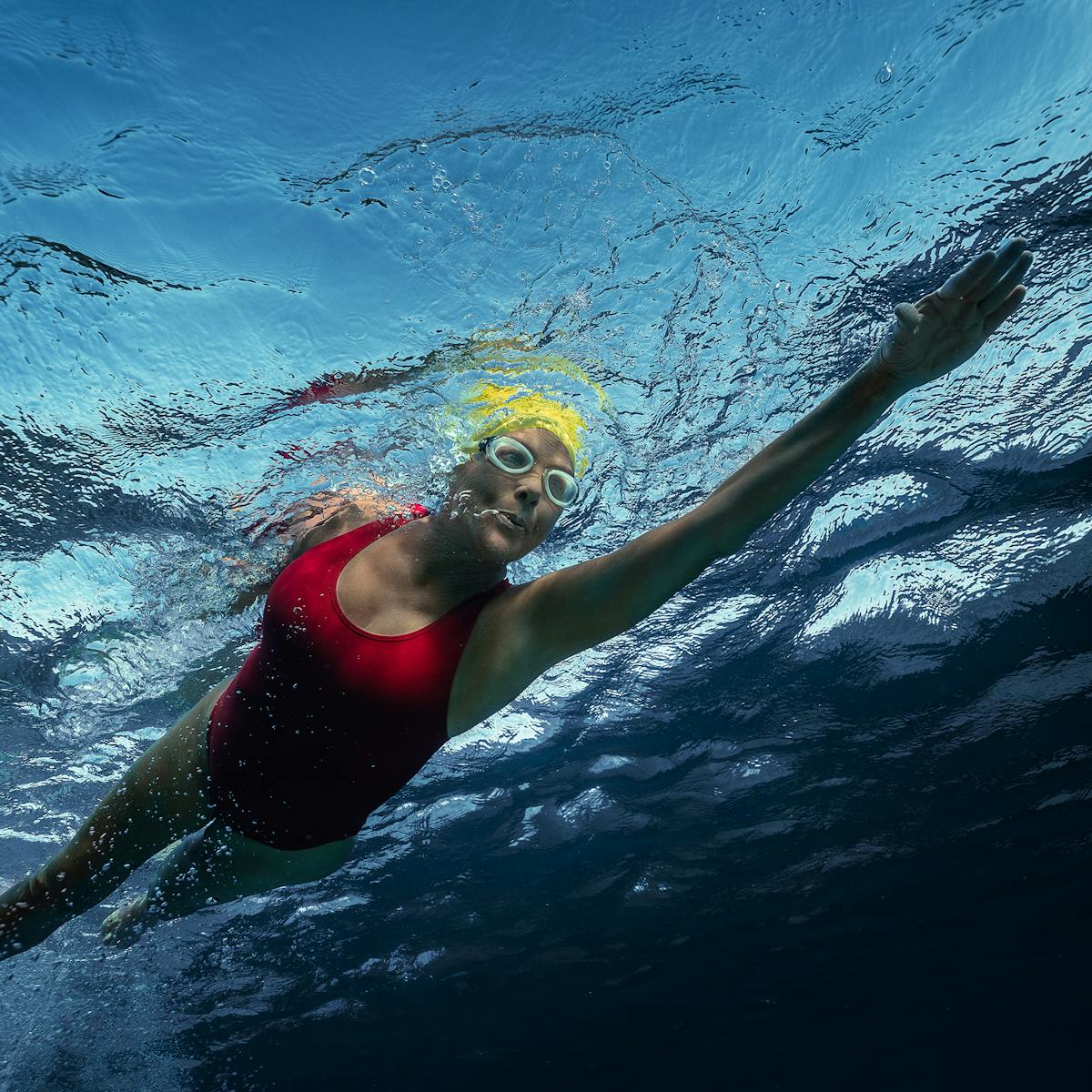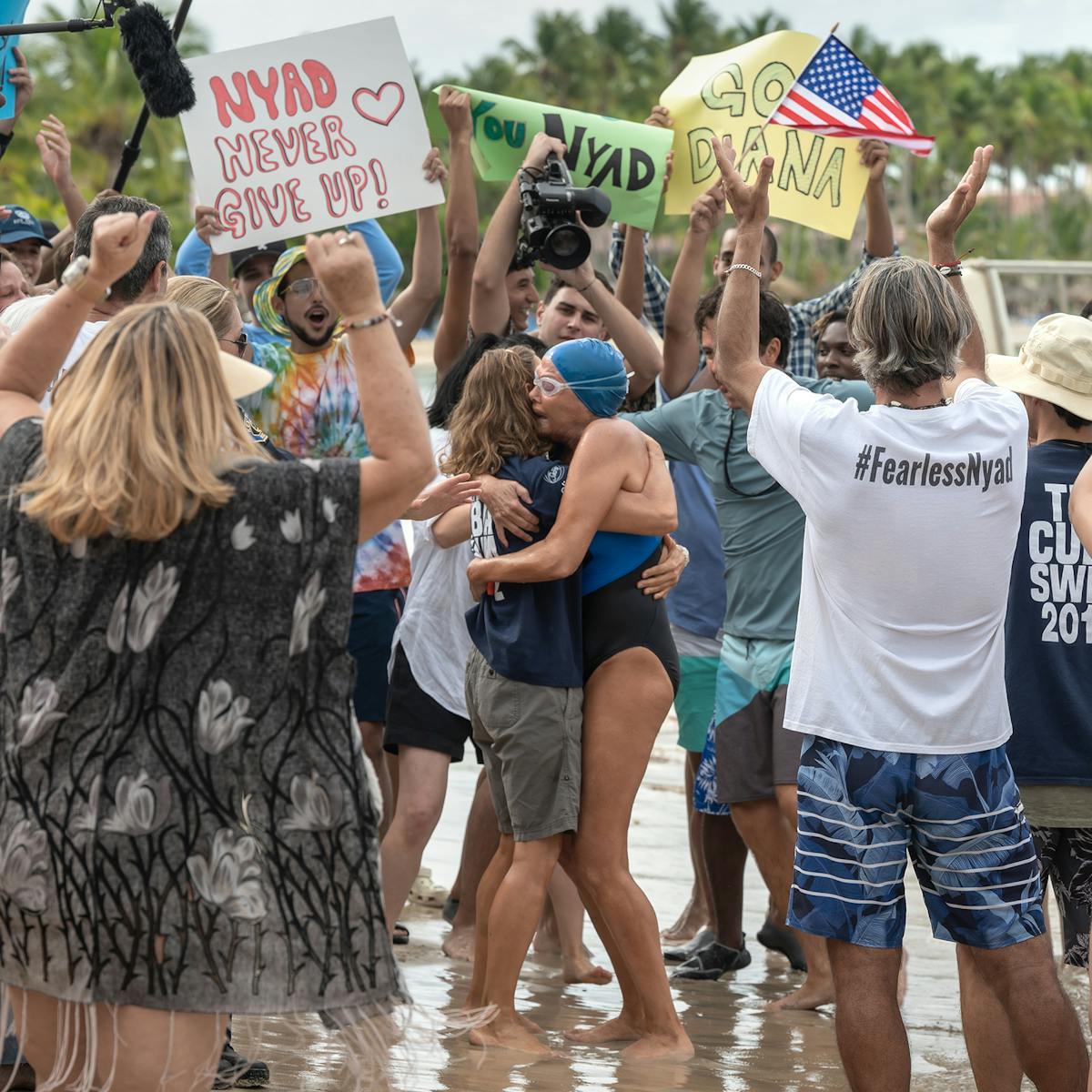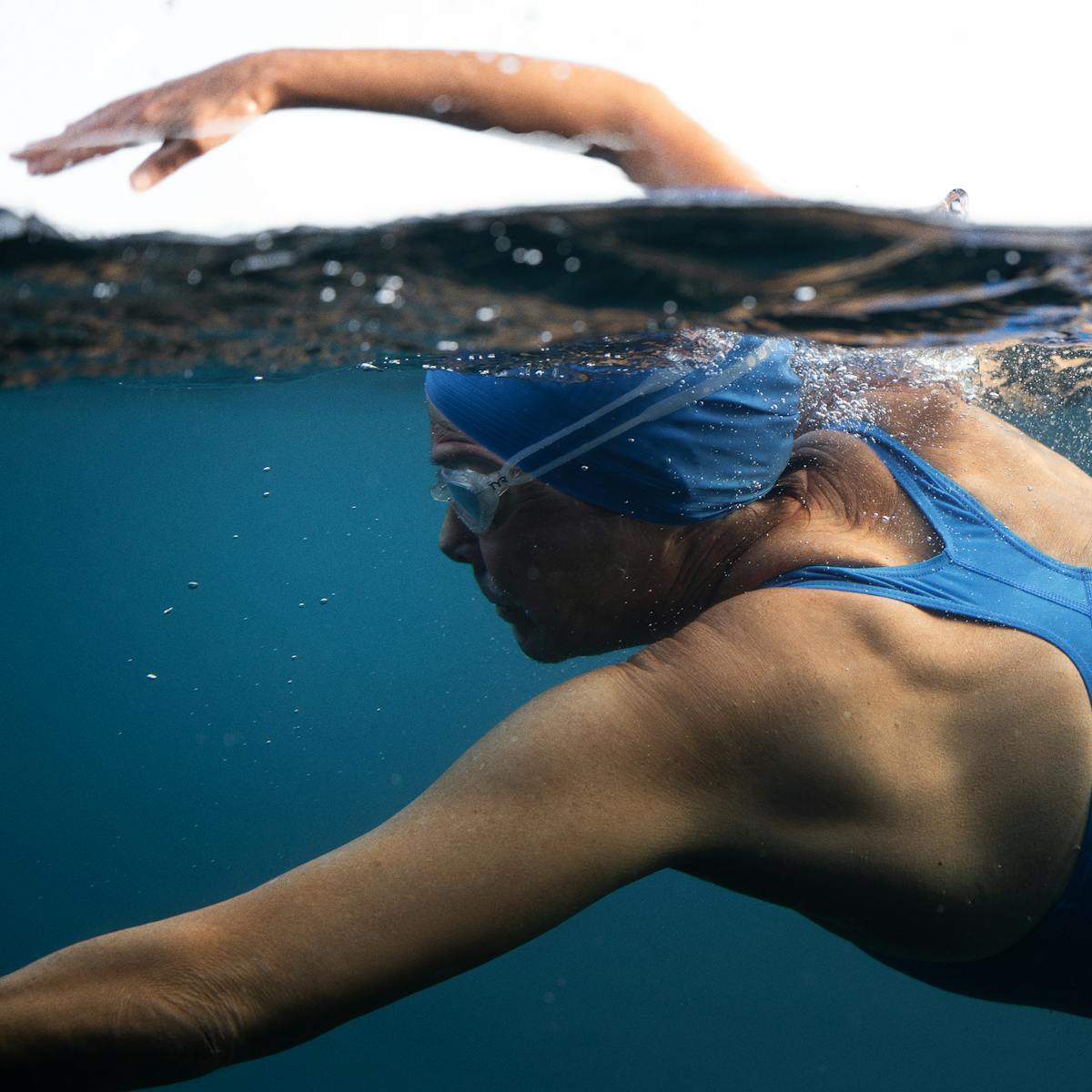Just like her latest onscreen persona, Diana Nyad, the Oscar-nominated actor dives headfirst into challenges.
Annette Bening just might be having the time of her life. At age 65, the venerable actor received her fifth Oscar nomination for her dazzling, daring performance in the real-life sports drama NYAD. The film, about journalist, author, and motivational speaker Diana Nyad returning to competitive long-distance swimming in her 60s after decades away, sees Bening in top form. She brings grit, fire, and determination to Nyad’s story of training to fulfill her lifelong dream: swimming 110 miles of open water from Cuba to Florida, at an age when most people are ready to retire. Whether on land or at sea, Nyad is a force of nature, refusing to allow any obstacle to prevent her from reaching her goal.
For Bening, the role was a godsend. She was delighted to find in Julia Cox’s screenplay — adapted from Nyad’s memoir Find a Way — the sort of woman she encounters in everyday life, yet so rarely appears onscreen. “Diana tried to do the Cuba to Florida swim when she was in her late twenties,” Bening says. “She failed. She went into broadcasting and did a bunch of other things for 30 years and then woke up at 60 and said, ‘You know what, I’m not really done.’ I think there are a lot of people who can relate to that. A lot of us want a challenge. I see that with my women friends. They take on something new at that stage of life. In my case, it’s this particular character. I was lucky that it was brought my way and I grabbed it.”
Let’s be honest, though — luck had very little to do with it. It was Bening’s talent and her impressive résumé that won her the title role in the first narrative feature from Oscar-winning documentary filmmakers Elizabeth Chai Vasarhelyi and Jimmy Chin (Free Solo). Bening became the toast of the town with her breakout role in the 1990 crime caper The Grifters, and subsequent powerhouse turns in such films as Bugsy, American Beauty, Being Julia, The Kids Are All Right, and 20th Century Women demonstrated time and again that the actor holds the screen like no other, radiating intellect and humanity in every part she plays. In NYAD, Bening is matched in intensity and commitment by screen partner Jodie Foster (also Oscar-nominated for her role in the film) as Bonnie Stoll, the former racquetball star who becomes Nyad’s dedicated coach and best friend.
Offscreen, Bening’s marriage to her life partner, actor Warren Beatty, is going strong after more than 30 years — a rarity in Hollywood — and the couple are enjoying a newfound empty nester status, now that their four children have headed out on their own. Her advice to them as they make their way in the world? “I want my kids to follow what they love,” Bening says.
Spoken like a true woman of passion.
An edited version of the conversation follows.

Diana Nyad (Annette Bening)
Photograph by Kimberley French
Krista Smith: You’ve said that when actors get a script for the first time, they have one free read before they start analyzing, Do I want to do this? How am I going to do this? What was that experience of your one free read when you got NYAD?
Annette Bening: I was really moved. I was really knocked out and shocked by the story. I’d never read anything like it, obviously, and I’d never done anything like it, nor did I ever imagine I would. Athletic in my 60s? Like, what? It never entered my imagination. She was so complex. That’s what I loved about her. She jumped off the page as this woman that I’d never seen in a story before on film. I immediately knew I was going to do it.
What do you remember about meeting Diana Nyad for the first time? And obviously Bonnie, who’s her best friend and trainer and support system.
AB: It was intense. The two of them were so intent on asking me questions. They wanted to know everything about me. They have a level of energy that is extraordinary. I think they were feeling particularly vulnerable. If you can imagine someone deciding to do your life story, I’m sure it was daunting. At that point, Diana shared some of her reservations with me, and I just said, “I’m on your side completely. I will protect you. I will advocate for you. None of us want to do anything but honor you. But we do have to create a narrative and an arc for this character.” So, the more she got to know me, the more time we spent together, the more I think she trusted [me]. I’m so grateful to her because she did trust me. It’s one of the real pleasures as an actor when you get to play someone like that; it’s so intimate.
One of the reasons a lot of people responded to the movie and the reason I responded to the story is because it’s such a relief to show women with all their complexities, their flaws. For so long, we just saw women who were these stereotypes. We didn’t see the nuance of our lives [reflected onscreen]. Our mothers and our grandmothers and their friends — there are all these interesting characters, but we didn’t see them in our stories. I love that we’re beginning to see these characters that have flaws — that have strengths and weaknesses and contradictions. That’s what I try to tease out of every character. I need to see people who aren’t idealized.
Working opposite Jodie Foster, whom you hadn’t previously known, how was the experience of meeting her and learning her process, so the two of you could convey this lifelong friendship and relationship between Diana and Bonnie?
AB: It was very easy. She’s very charming, very intelligent. When she agreed [to play Bonnie], I was thrilled, and we’ve become friends. I think part of the reason that it worked with us is that we’re both at a good place in terms of feeling a certain amount of freedom in our lives. Our kids are now grown; it’s a big difference when your kids are out of the house. I think we both feel a certain amount of liberation in our lives, too. We’re in it for the work. We’re in it because we love to do it, and having each other was a great thing. I tried to be there for her as much as I could. Emotionally, physically, in every way, and she was certainly there for me.

Karly Rothenberg, Elizabeth Chai Vasarhelyi, Annette Bening, Jodie Foster, Diana Nyad, Bonnie Stoll, Rhys Ifans, and Jimmy Chin
Photograph by Kimberley French
Let’s talk about the water. You’re in a Speedo for most of the movie. I felt like I was watching Diana Nyad. You had to learn to swim in this competitive way. Stunt doubles were standing by, but you did 99. 9 percent of the swimming.
AB: I did do it. I had an Olympic swimmer, Rada Owen, who was my coach, and I began to really enjoy it. I still swim. It’s the best exercise. It’s the best for the mind, the spirit, the bod. And it helps me sleep. So, I fell in love with swimming, and then I got so I could kind of pull it off. I knew it wouldn’t look right if somebody else was swimming, that you’d probably be able to tell, and that always bugs me [in movies]. Part of it is, I suppose, ego. It’s like, I have to do it because otherwise it’s not going to look right. But then I just enjoyed it. I liked being in the water. It felt good. The scenes where she’s struggling and having jellyfish and sharks and storms and allergic reactions and all of that, that’s another matter. But in terms of the swimming itself, it relaxed me every day.
You’ve received many awards and nominations for the work that you’ve done, playing so many great characters, so many complex women. Are there any that are more special to you than others? A role that you remember more vividly because of what was happening in your life at the time or that perhaps catapulted you into something else that you didn’t expect?
AB: When I think back, some of the movies that don’t get as much attention were just as meaningful. I made a movie called Mother and Child with Rodrigo Garcia that had such a big impact on me. Film Stars Don’t Die in Liverpool was one I really loved making about Gloria Grahame; it was a joy to do that. I did a movie [Valmont] with Miloš Forman. That was a dream job; I will always remember the moment I got the phone call, and they told me I got that movie. It was this period film shoot for six months in Europe with this great director, and the movie he had done before that was Amadeus. It changed my life, that experience. After that, I did The Grifters.

Annette Bening
Photograph by Ricky Middlesworth
The Grifters was like something we’d never seen before. It hit the zeitgeist in such a powerful way.
AB: Stephen Frears directed it. He was interested in film noir, so he was trying to do a modern film noir. Donald Westlake wrote the screenplay from the Jim Thompson book. Jim Thompson wrote these paperbacks that were super popular, but they happened to be very smart and very literate. They’re full of crime and subversion, and there’s always something twisted going on, in a great way.
Obviously you met your husband on Bugsy, and you went on to have four children together. Your youngest daughter is interested in acting.
AB: My youngest daughter Ella went to Juilliard. She graduated a year and a half ago, and she’s out there auditioning. She’s very serious about it. The fact that she found something she feels so strongly about, that she followed her instinct and got herself trained, I have a lot of respect for her. I don’t know what it’s like to be an upcoming actor or actress with social media and the pressures that are on people who are starting out. I think it’s tough. But the craft matters to me. I think it matters to a lot of people.




